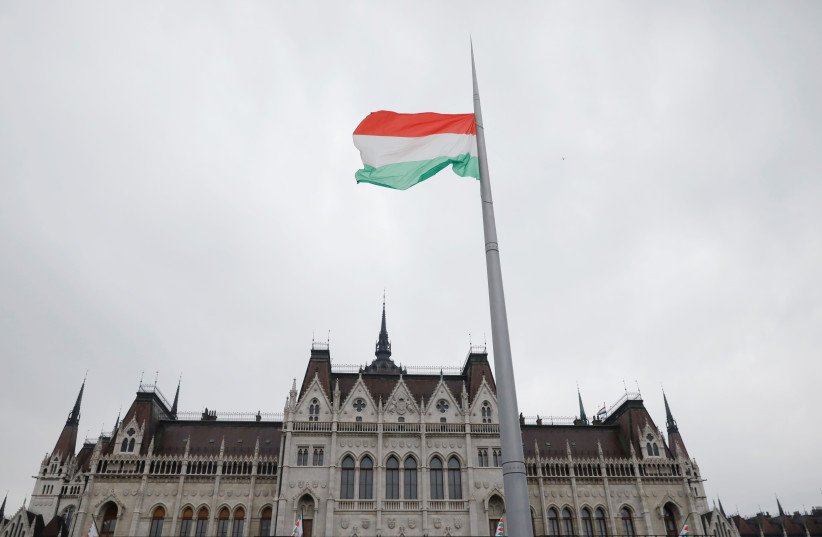Hungary's small Orthodox Jewish community claims that the Chabad-affiliated Association of Hungarian Jewish Communities (EMIH) community intends a "hostile takeover," of their community.
According to a summary of a long dispute between these two Orthodox Jewish communities in Hungary, written by the Autonomous Orthodox Jewish Community of Hungary (MAOIH), obtained by The Jerusalem Post, "About a year ago, a large number of new members infiltrated the small Hungarian Jewish Orthodox community in Budapest, which was organized by the Chabad-affiliated local rival community."
People close to the Hungarian Jewish communities explained that this dispute has to do with budgets and real estate. The Jewish communities of Hungary own real estate that is in a prime central location in Budapest, which is worth huge amounts of money.
What is the dispute going on in Hungary's Orthodox Jewish community?
According to the document, "this maneuver, which was made possible due to the naiveté and incautiousness of the community’s president, went against the community's bylaw." According to this document, on February 22, a general assembly was held "by the group of illegally admitted new members, and a new president and a general secretary were elected from their own ranks," the community document stated, concerning who they see as Chabad supporters who have joined their community and tried to take over. Chabad began working in Hungary in 1989 and at the beginning of the 2000s, Köves was the first rabbi to be ordained in the country since the Holocaust. He has since been very active and central in Jewish life in Hungary. In addition, he has worked very well with the leaders of the Hungarian government in the past years and therefore has a direct line of communication with the country's top officials.
According to MAOIH, leadership changes will require "legal-administrative approval from the Hungarian government."

According to this community, the legal-political battle between what they call the “old, legitimate community," and the "Chabad-affiliated intruders has reached a decisive phase. The conflict escalated several weeks ago when a delegation of Chabad representatives and government officials met with rabbis and politicians in Israel."
Israeli journalist Yanki Farber tweeted at the beginning of the month that "a secret meeting of Chief Rabbi David Lau, Rabbi Deutsch Ruby, president of the Orthodox community and Rabbi Shlomo Köves, president of the EMIH community, which took place in Hungary about two months ago, a dramatic decision was made to establish a union of communities - a very important move for the future of the Jewish communities in Hungary." Köves also visited Israel with Hungary's Religious Affairs Minister Miklós Soltész, who also met with Lau during his visit.
The Eda Haredit Rabbinic Court of Jerusalem issued a statement to the heads of the two communities and said that the rabbis of the Orthodox community in Budapest "objected to the meeting that was called for the purpose of electing a community leader and new board members." They even imposed a restraining order and foreclosure on a number of members who "call themselves the heads of the board," of the orthodox community, and against all new members "who wanted to replace the previous management of the community." They demanded to "freeze the decisions of the previous assembly" and thus not allow the replacement of the heads of the community until a hearing in the rabbinical court or before a neutral court acceptable to both parties.
According to the document, written by the MAOIH community, the three mentioned by the rabbinic court are "not followers of Chabad, but employed by them in a Chabad-controlled slaughterhouse in Hungary."
The EMIH community responded to the Post, stating that "the revival of Hungarian Jewry is very important to all members of the EMIH community. Although our community is affiliated with the Chabad movement, we cherish and respect our haredi [ultra-Orthodox] brothers," meaning the MAOIH community.
EMIH continued: "Unfortunately, over the past two decades, only a few dozen members remained in Hungary’s haredi community. Today that community has no institutions or property other than one synagogue; additionally, the community is rumored to have debts in the millions of euros.
"The Jewish community in Hungary is relatively small and we are delighted that many members of the haredi community have connected to Chabad and EMIH, given that we provide a basis for Jewish life in Hungary, with 15 synagogues; a kindergarten, high school and heder (religious school); an institute for rabbinic ordination; kosher slaughterhouse; restaurants; and many other institutions."
According to EMIH, "recent events have nothing to do with our community and we respect the decisions of the orthodox community and its leadership. Unfortunately, external parties are looking to stir up a fight and spread false accusations against us to serve their narrow interests.”
"Recent events have nothing to do with our community and we respect the decisions of the orthodox community and its leadership. Unfortunately, external parties are looking to stir up a fight and spread false accusations against us to serve their narrow interests.”
EMIH
According to the World Jewish Congress, the Hungarian Jewish community, estimated at between 75,000 and 100,000, is the largest in East Central Europe. The organization affiliated with the World Jewish Congress in Hungary is the Federation of the Hungarian Jewish Communities (MAZSIHISZ), which represents Neolog Judaism, a progressive stream that used to be popular in this area in Europe. Since then, in 2011, the government has also acknowledged the orthodox stream of Judaism as a representative.
